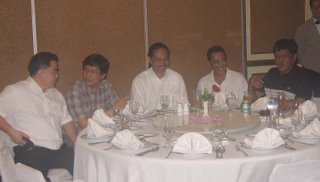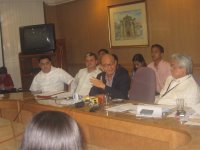ConCom Questionnaire
NAME: ______________________________________ SECTOR: ____________________ (Pls. indicate if you are with academe, gov't., labor, etc.) Dear Respondent: This survey merely aims to get the YOUR PULSE as regards to possible amendments to the Constitution. At the outset, we would like to clarify that NONE of the proposals are final until these shall have been thoroughly discussed by the Consultative Commission after the thorough consultations it is conducting now with various sectors in the different parts of the country. Once finalized, ConCom’s RECOMMENDATIONS will be submitted to the President, who shall in turn endorse it to Congress. These recommendations shall then be discussed in Congress and will pass through the proper CONSTITUTIONAL process (Constitutional Assembly, Constitutional Convention etc.). Finally, the proposed amendments will be submitted to the people, who will have the final say by via plebiscite. 1. FORM OF GOVERNMENT The existing form is PRESIDENTIAL with a BICAMERAL Legislature (the Senate representing the Upper House, the Congress representing Lower House, and the President, which are now in a GRIDLOCK). The President is given a mandate by a direct vote of the people. The President has a fixed term. A Presidential candidate spends roughly P4 billion or equivalent to more than 6,000 years’ presidential salary to run in an election. The concentration of power resides in the President. One of the PROPOSALS is an alternative, a modified PARLIAMENTARY form of government. To respect the terms of the President and the Vice President, both shall still serve and finish their terms until 2010 as head of state and deputy head of state, respectively, under a PARLIAMENTARY UNICAMERAL form. The head of government shall be the Prime Minister. The Prime Minister shall be voted upon by the members of the parliament. Members of Parliament are directly voted by the people per district similar to that of a congressional district which shall be much, much cheaper compared to a presidential election. All national decisions are done by the Prime Minister with due concurrence from the Parliament. The concentration of power resides in the Parliament. A PROPOSAL for respecting the term of the remaining 12 senators whose term shall expire on 2010 is for them to be automatically a part of the Parliament. The government is to be composed of cabinet members. The majority of the CABINET shall be appointed by the Prime Minister from among the members of Parliament. The Prime Minister may be replaced by a Vote of NO Confidence that any member of parliament may file and if given due course, an election of a new Prime Minister shall take place. If the Parliament fails to address the country’s problem the Parliament may be dissolved if it fails to reach a VOTE OF CONFIDENCE that a Prime Minister may file. A new election for the Members of Parliament shall then be conducted. WHICH FORM DO YOU PREFER? (a) Presidential-Bicameral (b) Parliamentary-Unicameral (c) Others (Please indicate your proposal) ____________________ 2. STRUCTURE OF THE REPUBLIC The existing is a centralized unitary structure where the law of the land is uniform throughout the country. Internal Revenue is collected by the national government and is then distributed to the 1,616 cities and municipalities using a fixed formula as indicated in RA 7160. The political subdivisions are empowered by the Local Government Code; Cabinet members are appointed by the President. A huge chunk of the budget is used for Line Agencies that handle the entire country’s concerns for public works, health, education, etc. The alternative is the creation of Federal States (start as Autonomous Regions) that shall form their own state judicial body, their own STATE ASSEMBLY, which shall take into consideration the political subdivisions already in place, such as the barangays, municipalities, cities and the provinces. Share in revenue shall be based on the Actual Income Contribution of the Region. The state shall be empowered to create their own Line agencies, which shall be headed by Secretaries appointed by the STATE Governor. Majority of the Secretaries shall be coming from the State Assembly. The State Governor may also appoint individuals with expertise for a particular agency that shall address directly the concerns of the state. Since the Line agencies are no longer on the national level, it shall be assumed that budgetary allocations for National Line Agencies shall be devolved to the State Line Agencies during the period of transition. Within its territorial jurisdiction and subject to the provisions of the Constitution and national laws, the organic act of the autonomous regions shall provide for legislative powers of their State Assemblies over: (1) Administrative organization, planning, budget, and management; (2) Creation of sources of revenues and finance; (3) Peace, public safety, police, and justice; (4) Agriculture and fisheries; (5) Natural resources, energy and environment; (6) Trade, industry, and tourism; (7) Labor and employment; (8) Public works, transportation and communication; (9) Health and social welfare; (10) Education and the development of language, culture and the arts as part of the cultural heritage; (11) Ancestral domain and natural resources; (12) Personal, family, and property relations; (13) Housing, which will be easier for the State to develop; and (14) Such other matters as may be authorized by law for the promotion of the general welfare of the people of the autonomous region. Each Federal State and local government unit shall have the power to create its own sources of revenues and to levy taxes, fees, and charges subject to such guidelines and limitations as the Parliament may provide, consistent with the basic policy of regional and local autonomy. Such taxes, fees, and charges shall accrue exclusively to concerned autonomous regions or local governments. Budgets that are not allocated for the different line agencies shall be devolved to the States. WHICH STRUCTURE DO YOU PREFER? (a) Unitary structure (b) Federal structure 3. NATIONAL PATRIMONY 1935 Commonwealth Constitution. Article XIII of the 1935 Constitution limited the development and utilization of natural resources, and operation of public utilities to Filipino citizens or corporations owned at least 60% by Filipinos. The same restriction was imposed on ownership of private agricultural land, although by a Supreme Court decision this was later interpreted to extend to lands for residential, commercial and industrial uses. The 1973 and 1987 Constitutions expanded the restrictions on foreign ownership even as changes in national economy and the international economic environment were adverse, and as globalization became the international order. In contrast a majority of developing countries around the world, including Communist China and Vietnam, have been aggressively inviting foreign investment to help develop their economies. Yet our Constitution continues to restrict foreign investment which would provide the capital to improve our infrastructure and establish new industries. This capital would come with technology, management and access to markets abroad, create needed jobs for our youth and attract back OFW’s whom their affiliated companies presently employ as technicians and supervisors abroad. These are some reasons why members of the Consultative Commission believe it is timely to allow more foreign investment in the Philippine economy. (NOTE: Allowing foreign investments shall all be subject to the laws and regulations that may be imposed by the Congress or Parliament.) 1. Public utilities include passenger shipping, rail transits, airlines, telecommunications, water distribution, and distribution of electricity. The 1987 Constitution allows not more than 40% foreign ownership in companies owning and operating public utilities. Most Commission members favor that the new Constitution should allow up to 100% foreign ownership in public utilities to inject the capital needed to improve services of public utilities, and make those services more widely available. Would you agree or do you prefer to retain present restrictions for not more than 40% foreign ownership? (a) Agree to allow 100% (b) Retain 40% 2. The 1987 Constitution also imposes 40% foreign ownership restriction in educational institutions except those which are established by religious groups. Would you want those restrictions to be lifted entirely or in part? YES NO 3. Other businesses in which the Constitution limits the percentage of foreign ownership or prohibits it entirely are: advertising (30%); mass media, like newspapers, radio and TV broadcasting (0%). ADVERTISING: (a) Allow 100% (b) Retain 30% Do you favor the Constitution allowing more foreign ownership in Mass Media? (a) Allow 100% (b) Allow 40% (c) Retain 0% 4. Our next area of discussion is in the area of development and utilization of natural resources. All Constitutions since 1935 declared all natural resources – forests, minerals, petroleum and other mineral oils, coal and other potential sources of energy, waters and others – to be OWNED by the State, but allow for agreements of the State with private entities to develop the natural resources. These agreements may be entered into only with Filipino citizens or corporations whose ownership is at least 60% Filipino. Many members of the Committee think Large Scale Development of these resources (such as mining) could be hastened and provide more benefits for the economy if allowed to be done by foreign companies with 100% ownership, under strict State supervision. Small scale developments will be restricted to fully Filipino owned companies. (Note: Natural resources are OWNED by the state. We are only talking about the developer/s who shall be the partner/s of the State.) Would you agree to allow Large Scale Development be handled by Foreign Companies, or would the 40% limitation on foreign ownership of companies to help develop natural resources be maintained? (a) Allow 100% (b) Retain 40% 5. The 1987 Constitution allows lease of Public Lands suitable for agriculture; the lease may be for a term of not more than 25 years, renewable for another 25 years. Some members of the commission suggest allowing the term of lease to be as long as 50 years, renewable for another 50 years. The reason is to make feasible long term developments of Filipinos, to accommodate long term crops like hardwood trees, and give enough time to recover big investments made in project infrastructure such as roads’ irrigation systems, etc. Would you agree to make long term lease of public lands for agriculture be 50 years? (a) Retain 25 years (b) Make it 50 years 6. Foreign investors say they will feel more secure if they own the land on which their factory or commercial development (e.g. hotels, tourist resorts), instead of renting the land from a corporation in which they can own not more than 40%. Many members of the Commission believe this is an understandable concern, and suggest that ownership of commercial and industrial lands be allowed to foreign companies, under conditions to be specified by Congress, such as establishment of the proposed industrial or commercial project within a specified time period. Would you agree? (a) Allow 100% (b) Retain 40% 7. If you agree in removing the limitation on commercial and industrial lands, how do you stand on allowing foreigners to own Residential lands, under conditions to be specified by Congress? (a) AGREE (b) DISAGREE 8. What is your stand on foreign ownership of PRIVATE Agricultural Lands – retain the present 60-40 restriction or allow 100% foreign ownership? (a) Retain 60-40 (b) Allow 100% Foreign ownership 9. Do you want the maximum of three consecutive term limit of elected officials removed? YES NO 10. Do you want to increase the term of elected officials to five years from the present three years? YES NO 11. Do you want to lift the economic restrictions to pave the way for the entry of foreign investors that will build factories and companies that shall employ millions of workers, as what is being done in China? YES NO 12. If you would want to have changes in the Constitution, are you willing to have a people’s initiative? YES NO 13. Do you want to eliminate turncoatism by passing a law that an official elected under a political party may only change party by resigning his public elective position? YES NO 14. Do you want to authorize the establishment of Autonomous Regions to give way to the smooth transition to Federalism? YES NO Thank you for your participation. PLEASE E-MAIL THIS QUESTIONNAIRE AS AN ATTACHED FILE TO: commissioner.alvin@gmail.com, OR FAX TO: (75) 515-5535, OR MAIL TO: Commissioner ALVIN D. FERNANDEZ, Vice Mayor’s Office, City Hall, Dagupan City 2400






































